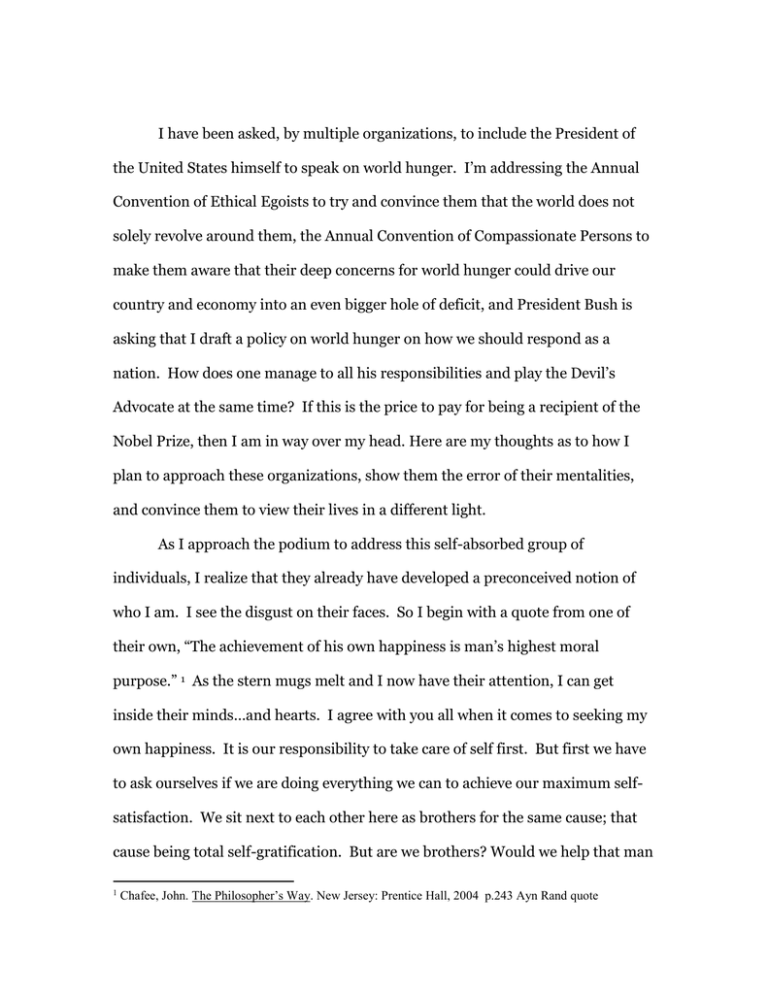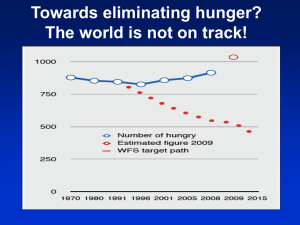I have been asked, by multiple organizations, to include the... the United States himself to speak on world hunger. ...
advertisement

I have been asked, by multiple organizations, to include the President of the United States himself to speak on world hunger. I’m addressing the Annual Convention of Ethical Egoists to try and convince them that the world does not solely revolve around them, the Annual Convention of Compassionate Persons to make them aware that their deep concerns for world hunger could drive our country and economy into an even bigger hole of deficit, and President Bush is asking that I draft a policy on world hunger on how we should respond as a nation. How does one manage to all his responsibilities and play the Devil’s Advocate at the same time? If this is the price to pay for being a recipient of the Nobel Prize, then I am in way over my head. Here are my thoughts as to how I plan to approach these organizations, show them the error of their mentalities, and convince them to view their lives in a different light. As I approach the podium to address this self-absorbed group of individuals, I realize that they already have developed a preconceived notion of who I am. I see the disgust on their faces. So I begin with a quote from one of their own, “The achievement of his own happiness is man’s highest moral purpose.” 1 As the stern mugs melt and I now have their attention, I can get inside their minds…and hearts. I agree with you all when it comes to seeking my own happiness. It is our responsibility to take care of self first. But first we have to ask ourselves if we are doing everything we can to achieve our maximum selfsatisfaction. We sit next to each other here as brothers for the same cause; that cause being total self-gratification. But are we brothers? Would we help that man 1 Chafee, John. The Philosopher’s Way. New Jersey: Prentice Hall, 2004 p.243 Ayn Rand quote or woman sitting next to us if it meant sacrificing any part of ourselves? I would and I believe this is where our mentalities differ but I am here to show you that you have not completely satisfied your own interests to the fullest. Your souls are lacking that total fulfillment that you claim to have. Now how do we complete our selfishness? We help those who need it most. World Hunger is real. Being part of such a vast number of individuals who are not directly affected by these unfortunate circumstances, you do not see the problem in other parts of the world. It even affects part of our own country yet you are so blinded by your own greed, that it is not a factor in your life. This is where you are depriving yourself of total selfishness. Robert McNamara, former president of the World Bank said that: “Compared to those fortunate enough to live in developed countries, individuals in the poorest nations have an infant mortality rate eight times higher, a life expectancy one-third lower, an adult literacy rate 60 percent less, a nutritional level, for one out of every two in the population, below acceptable standards; and for millions of infants, less protein than is sufficient to permit optimum development of the brain.”2 In the same vicinity of this quote, absolute poverty is defined as the lack of sufficient income in cash or kind to meet the most basic biological needs for food, clothing, and shelter. Now all of you have a heart for your own personal moral beliefs. If you can not see the need for all of us to extend our fortunate lifestyles 2 Hinman, Lawrence M. Contemporary Moral issues. New Jersey: Prentice Hall, 2006 pp. 344-345 just a little to help those in need, do you really have a heart at all? Are you really that selfish to deprive your own soul of total gratification? Think about the statistics you have heard here today and ask yourself, “How can I attain maximum satisfaction?” Thank you for your time today, I hope that I have touched a few souls to do what’s right for our world and ourselves, and good luck on your journeys to satisfying your souls. Wow! I think that presentation went pretty well. I even received a standing ovation and handshakes to go along with some warm wishes. Now it’s off to the ACCP to do the opposite of what I just did here. As I walk to the stage, the welcoming committee was completely different that that of the ACEE. I received smiles and applauses as I reached the podium. I also start this speech off with a quote from Garrett Hardin, “Rich nations should not try to help poor, starving ones. Rich nations are like lifeboats, sailing in a sea amid drowning poor people who want to get into their boats. If the poor get in the boats, they will only sink them and everyone will perish.”3 Obviously there were a multitude of boos in the audience and another obvious factor was going to be that I would have a tougher time convincing this crowd to tone down their generosity towards the poor and needy. I understand and agree with your reactions to this quote and Garrett Hardin’s views but let’s imagine his mentality for a second. Of course, his view leaves absolutely no room to help those less fortunate nations which are part of our World Hunger Campaign. The reality of the situation is that, though we are a powerful nation and have many resources to do our part, we are not able to help everyone. There will always be hungry mouths to feed and extended hands 3 Hinman, Lawrence M. Contemporary Moral issues. New Jersey: Prentice Hall, 2006 p.335 Hardin quote to fill. We can not let our compassion get the best of us. We can not let our compassion put us in a position where we will soon be the ones with our hands out for help. What we can do is solicit other nations that are fortunate enough to be in similar situations we are in, to help the less fortunate ones. We can form organizations to meet with those nation’s representatives at the local embassies to reach out to their governments. We can stay on top of the other Great 8 nations to do their part. All the energy and compassion we devote to our own government to help can be shifted to the other nations. Again, the United States can not provide for the entire world, all we can do is our part without driving ourselves into starvation. What we can do as individuals of our wonderful and blessed country is commit to an idea and see it through. If we can put the pressure on other nations to give as much as we give, we will be able to accomplish the same goal world wide. Peter Singer, a Professor in Princeton’s University’s Center for Human Values says, “We feel an obligation of kinship more strongly than those of citizenship.”4 Is this true of all of us? Have we forgotten about our own people? Do we think that world hunger does not involve some citizens of the United States of America? We do have to realize that our own people are just as important as those from other countries. I do believe I have the support of a lot of everyone here when I say that something needs to be done about the growing concern of world hunger. I hope I now have a growing number of believers that understand we can stretch ourselves, as a nation, to thin to the point of no return; that point being self destruction. Thank you for allowing me to speak with you today. I hope that we all have learned a little more about shifting our energies to accomplish the common goal we both share. 4 Hinman, Lawrence M. Contemporary Moral issues. New Jersey: Prentice Hall, 2006 p.353 Singer quote Now that I have completed my Devil’s Advocate routine, I have to focus on drafting a proposal of how we are as a nation should handle this issue of world hunger. The issues at hand would be to successfully help ourselves before we can help others, implementing the same plan to other nations that have worked for us, pressuring other successful nations to work together to accomplish a common goal, and to oversee the progress for our World Hunger Campaign. First matter at hand would be to institute ideas that would help our own starving victims here in the United States. I believe we are doing a great job now at providing shelters, food closets, and churches that offer those in need a place to go for a hot meal. Like I stated before, we can’t help everyone, especially if they refuse the help that is offered. We need to seek out those who are hiding from help, those who may be too ashamed to ask for the help, and those who are still not aware what help is out there for them. Publicity is always a good initiative to partake when getting the world out about what is offered. Billboards, busses, trains, and even volunteers who are eager to be a part of our campaign, can serve as the mouthpiece for our efforts. If the individuals who are in need of help are afraid to ask, let’s find them. Providing counseling for those in need can also be offered to help them get back on their feet at their own pace. Though this will be a structured effort, we still have to remember that those coming for help have little to nothing to rise from. Again, volunteers will be asked to help with our counseling efforts. Secondly, once we have successfully instituted our plan with our own nation, we can widespread these efforts across the globe. We can share our success with the other nations involved in our efforts and have them institute similar plans. We can slowly implement these efforts to countries one by one until the situation is stable enough to run on its own accord. Of course, we would offer assistance with local governments, or act as governments if one is not in place. This is a long term investment that will eventually show signs of improvement with the number of starving individuals going south. Thirdly, we need to pressure other nations to join our World Hunger Campaign. This is imperative in order to succeed with our efforts. There is no country in the world that is not affected by world hunger issues therefore we are all responsible to help our own, at bare minimum. In one form or the other, we are all responsible to each who is starving. Like Hugh LaFollette and Larry May stated, “If we are the cause of harm, then we are responsible to the “victim” because we are responsible for their condition.”5 As soon as the nations realize this fact, they will be more than willing to become part of the solution. It is our job as a leading nation to hold other nations to their word. We can only do but so much so it is imperative that we do all we can to increase maximum participation. Lastly, supervision is paramount in any plan. We are steadfast in making this campaign work so we are that much more devoted in supervising all the implementations in place and to see our ideas through. We can have a traveling group of supervisors who’s purpose to the Campaign is to go around and offer their advice, report any negative findings, offer suggestions to fix any problems, and correct issues that need attention. All reports will be provided back to their home governments for review which can determine the success and progress of our world efforts. Between the speeches I gave today and the proposal I’ve written for the president, I have a new found respect from all angles of the equation. I believe my efforts today will have a huge impact on groups around the area. I hope that my words have touched souls in the since that they were motivated to act in a more positive manner for the benefit of all people. 5 Hinman, Lawrence M. Contemporary Moral issues. New Jersey: Prentice Hall, 2006 p.363 Work Cited Page 1. Chafee, John. The Philosopher’s Way. New Jersey: Prentice Hall, 2004 2. Hinman, Lawrence M. Contemporary Moral issues. New Jersey: Prentice Hall, 2006 Campaign: World Hunger Aaron J Hudson Prof. John Chaffee


